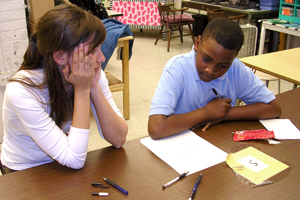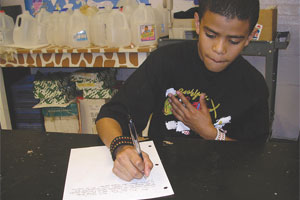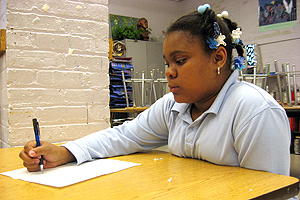South Side Scribblers make their mark on neighborhood schools
By Deva Woodlydeva@uchicago.edu
News Office
 Photos courtesy of South Side Scribblers Fourth-year Thalia Gigerenzer has been an after-school instructor for the South Side Scribblers since her first year in the College. She believes the creative writing skills she and other University students help to develop in third- through eighth-graders in area schools are skills these children will use all of their lives. Having discovered writing as a child, Gigerenzer now passes on that expression of the imagination. Above she prompts sixth-grader Lakkeriel Woods to develop a story using the terms fireman, bubblegum and loneliness. | |
 | |
 Sixth-graders at Bret Harte School Alexis Bishop (directly above) and Emani Woods (top) create their essays in the South Side Scribblers after-school program. | |
The first thing Jacob Cogan says about the South Side Scribblers is “We don’t help with homework.” Cogan and two other co-directors, Thalia Gigerenzer and Mary Dory, coordinate a growing number of University students who teach creative writing to students in grades three through eight at four neighborhood schools.
The Ray School, St. Thomas the Apostle Elementary, Bret Harte School and the Woodlawn campus of the University of Chicago Charter School all have existing after-school programs, but none could afford the luxury of a creative writing program if not for the Scribbler volunteers. “We have a very clear mission, and our purpose is to craft a place where kids can express themselves and create,” says Cogan.
Gigerenzer, a fourth-year in the College, believes the South Side Scribblers make a valuable and unique contribution. “Most of the kids’ after-school training and much of what they do in class is about preparing them to pass required tests,” she says. “We think it’s also important for them to have the tools to express themselves creatively. It’s a skill they can use their whole lives.”
Gigerenzer began teaching in the Scribblers program during her first year in the College. “When I was small,” she recalls, “I wrote these silly little chapter books about whatever struck me. It really had an affect on me, and I wanted to give other kids that experience.” Also, she says, “I wanted to get to know the community I was going to be living in for the next four years.”
One of her first lessons was that her role as an after-school teacher was different than she had thought. “At struggling schools, the role of the teacher is complex. You’re not just an instructor, giving assignments and information, you’re really a confidant.”
Cogan notes that strong bonds of connection form between the instructor and the kids, as well as the young students. He relates a story about his first group of students, fifth-grade girls who wrote a “pass-along story” for a classmate who moved away during the school year. Each of the girls wrote a few imaginative passages and then sent the unfinished story to their former classmate to complete from her new home across the city.
The elementary school children who participate in the program describe the Scribblers as a class that is never boring. Adia, a tom-boyish sixth-grader who has been in the Scribblers program for three years, says, as she delights the class with a Michael Jackson dance impression: “I like it because you can write whatever you want and you don’t get in trouble.” Chyyna, a fellow classmate, raises her hand to add, “You never know what you’re going to do next!”
That willingness to explore is reflected not only in the Scribblers’ creative writing prompts, but also in the direction the organization has taken. Gigerenzer, inspired by her work with the Neighborhood Writing Alliance, a member of the Civic Knowledge Project’s Arts and Humanities Network, decided last year to open an adult course at Maria’s Shelter, a transitional home for women located in Englewood.
The shelter’s writing program also has been a great success. “I’ve been amazed,” says Cogan. “These women write some really sophisticated, really personal stuff. It’s been such a learning experience for us.”
That spirit of mutual learning seems to run throughout the Scribblers program. Student volunteers share their love of creative writing to contribute something to the University’s neighboring communities. The openness and talent of the people whom they find leaves the students inspired and rejuvenated.
“I got involved with Scribblers because I thought it was a good way to stay involved with creative writing,” Cogan says, “but I soon realized it was also an amazing escape.” On campus there are all the stresses of being a student at a top university, “but then you have this one hour a week when you really feel like you’re making a difference.”
![[Chronicle]](/images/sidebar_header_oct06.gif)